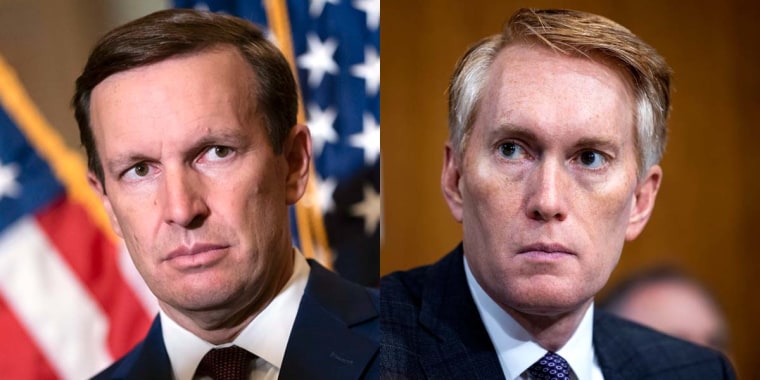WASHINGTON — A bipartisan group of senators resumed border talks Thursday, offering faint hope that Congress can craft and pass a broad legislative package that would include aid for Israel and Ukraine before the end of the year.
The lead negotiators — Sens. Chris Murphy, D-Conn., and James Lankford, R-Okla. — met Thursday afternoon, Lankford and a Democratic source familiar with the negotiations told NBC News.
The meeting did not yield a final result, but a new proposal was discussed, both said. It took place in the basement hideaway office of Sen. Kyrsten Sinema, I-Ariz., who has also been involved in the effort.
“They are back at the table, negotiations are back,” the Democratic source said. “Republicans presented us a proposal, we are still digesting it. There is still a lot of daylight between the two sides.”
The source said conversations will continue remotely Friday and into the weekend, as senators left Washington, D.C., for the week on Thursday.
“Amazingly, we have phones and internet and email and everything else, and so will continue to stay in contact,” Lankford told reporters as he left the Capitol.
“We’re going to continue to talk,” said Murphy.
The negotiations had stalled last Friday and are resuming a day after the Senate failed to advance an Israel and Ukraine aid bill over Republican objections that it lacked immigration policy changes. Tensions were high Thursday, but seem to have calmed.
Lankford and other Republicans said that President Joe Biden’s remark on Wednesday that he was “willing to make significant compromises on the border” in order to secure money for Ukraine helped bring the two sides back to the table.
“The White House made a very clear statement: Hey, let’s actually get something resolved, Ukraine’s too important not to be able to do this,” Lankford said. “So I did think it was helpful for him to be able to make that statement, and I reciprocated right back to the White House: I hear you. We’re not trying to be able to overask either.”
Sinema, speaking with KVOA News in Tucson, said the bipartisan group is “making progress, but there is still a ways to go.” She also called on colleagues to “come to the middle and solve this crisis together.”
But with Congress set to leave town for the year at the end of next week, Lankford admitted that they would likely need to add more legislative days if they wanted to finish a deal before the holidays.
“There’s a week left on the schedule, but we’ve added weeks before,” Lankford said.
Some senators are not so optimistic that the group can reach the agreement that’s needed to unlock passage of the entire package before next year.
“I just don’t think it’s realistic to expect that they’re going to take it up and pass it, especially if they’re planning on leaving,” Sen. John Cornyn, R-Texas, said. “So I think we’re unfortunately looking at a January exercise.”
Sen. Thom Tillis, R-N.C., agreed. “I, for one, think it’s unlikely that we get done by Christmas, and I hope I’m proven wrong.”
During a press conference earlier Thursday, Sen. Lindsey Graham, R-S.C., said it was time for Biden to be a part of negotiations.
“These negotiations need to change — the president United States should be involved,” Graham said. “He is responsible for this situation more than any member of the House [or] the Senate. He is the commander in chief, and when it comes to securing our border, our Commander in Chief Joe Biden is AWOL.”
Lankford said he has been speaking to White House staff throughout this process, and that he agreed the president needs to be a part of the negotiations. But he declined to specify what that would involve.
“The White House has got to be engaged in this,” Lankford said. “If the White House is not engaged into the negotiations, then nothing’s going to get done on it.”



